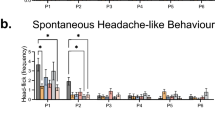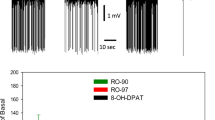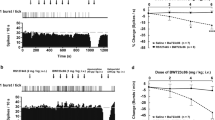Abstract
WHEN tryptophan is administered to rats pretreated with a monoamine oxidase (MAO) inhibitor there results a characteristic syndrome of hyperactivity. This syndrome seems to be due to the increased synthesis and accumulation of the putative neurotransmitter 5-hydroxytryptamine (5-HT) and its ‘spill-over’ into functional activity which is presumably dependent on the stimulation of postsynaptic 5-HT receptors1. A qualitatively similar syndrome is produced by the administration of 5-methoxyN,N-dimethyltryptamine which, it has been suggested, directly stimulates 5-HT postsynaptic receptors2. This hyperactivity syndrome has been used to investigate the functional organisation of brain 5-hydroxytryptamine, the action of drugs such as chlorpromazine2, reserpine1 and lithium3 and to investigate the role of brain catecholamines4 in the mediation of brain 5-HT function.
This is a preview of subscription content, access via your institution
Access options
Subscribe to this journal
Receive 51 print issues and online access
$199.00 per year
only $3.90 per issue
Buy this article
- Purchase on Springer Link
- Instant access to full article PDF
Prices may be subject to local taxes which are calculated during checkout
Similar content being viewed by others
References
Grahame-Smith, D. G., J. Neurochem., 18, 1053–1066 (1971).
Grahame-Smith, D. G., Br. J. Pharmac., 43, 856–864 (1971).
Grahame-Smith, D. G., and Green, A. R., Br. J. Pharmac. (in the press).
Green, A. R., and Grahame-Smith, D. G., Neuropharmacology (in the press).
Prange, A. J., Wilson, I. C., Lara, P. P., Alltop, L. B., and Breese, G. R., Lancet, ii, 999–1002 (1972).
Coppen, A., Shaw, D. M., and Farrell, J. P., Lancet, i, 79–81 (1963).
Bunney, W. E., and Davis, J. M., Arch. gen. Psychiat., 13, 483–494 (1965).
Zall, H., Am. J. Psychiat., 127, 136–139 (1971).
Himmelhoch, J. M., Detre, T., Kupfer, J. D., Swartzburg, M., and Byck, R., J. nerv. ment. Dis., 155, 216–220 (1972).
Plotnikoff, N. P., Prange, A. J., Breese, G. R., Anderson, M. S., and Wilson, I. C., Science, 178, 417–418 (1972).
Snedecor, S. W., and Cochran, W. G., Statistical Methods (Iowa State Press, 1967).
Plotnikoff, N. P., Kastin, A. J., Anderson, M. S., and Schally, A. V., Life Sci., 10, 1279–1283 (1971).
Ehrensing, R. H., and Kastin, A. J., Arch. gen. Psychiat., 30, 63–65 (1974).
North, R. B., Harik, S. I., and Snyder, S. H., Brain Res., 63, 435–439 (1973).
Snyder, S. H., Am. J. Psychiat., 27, 169–179 (1972).
Keller, H. H., Bartholini, G., and Pletscher, A., Nature, 248, 528–529 (1974).
Author information
Authors and Affiliations
Rights and permissions
About this article
Cite this article
GREEN, A., GRAHAME-SMITH, D. TRH potentiates behavioural changes following increased brain 5-hydroxytryptamine accumulation in rats. Nature 251, 524–526 (1974). https://doi.org/10.1038/251524a0
Received:
Revised:
Issue Date:
DOI: https://doi.org/10.1038/251524a0
This article is cited by
Comments
By submitting a comment you agree to abide by our Terms and Community Guidelines. If you find something abusive or that does not comply with our terms or guidelines please flag it as inappropriate.



